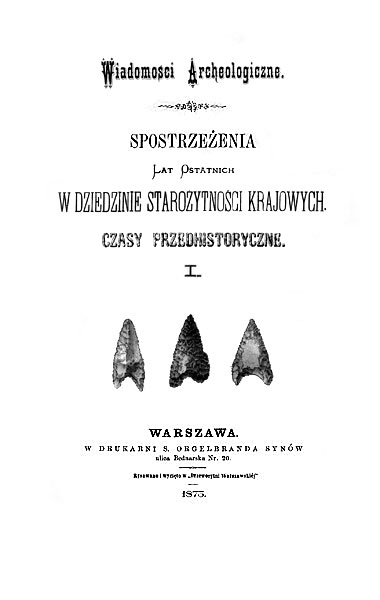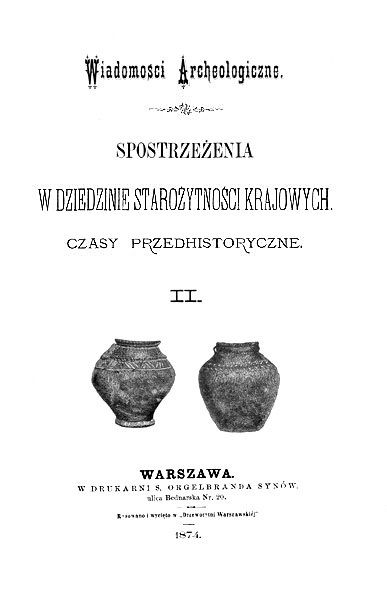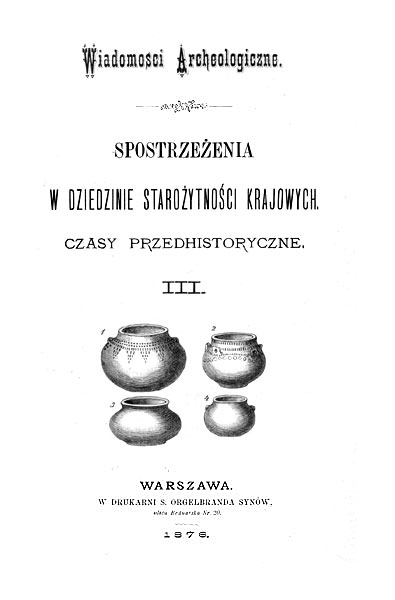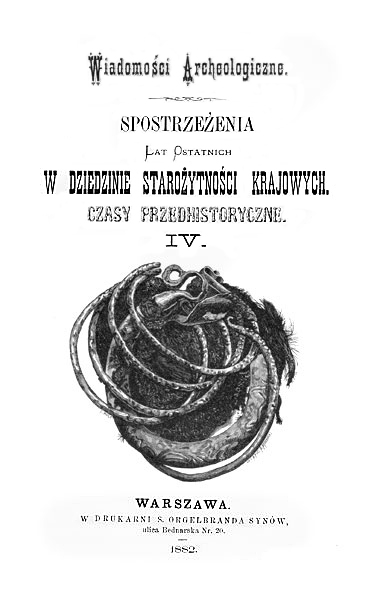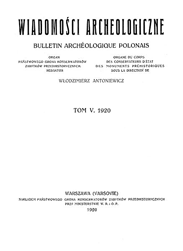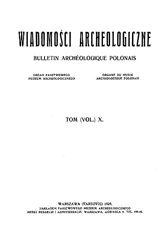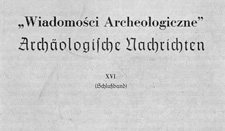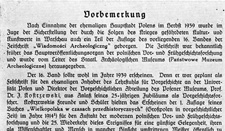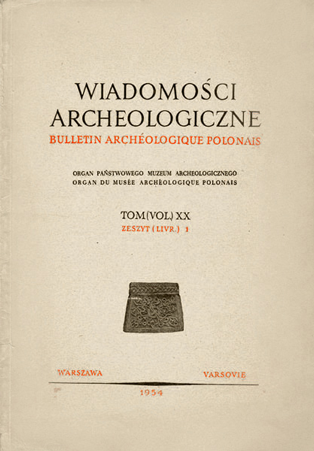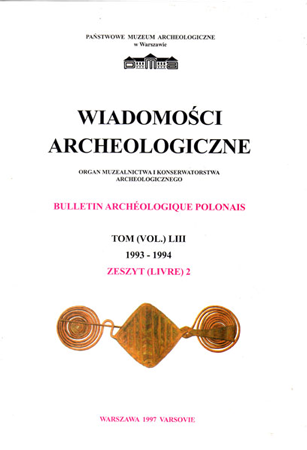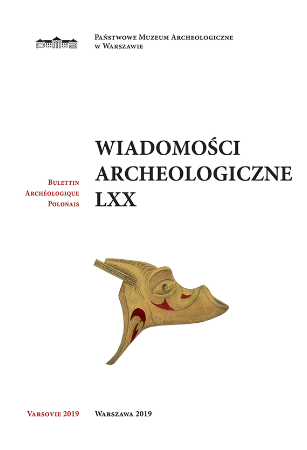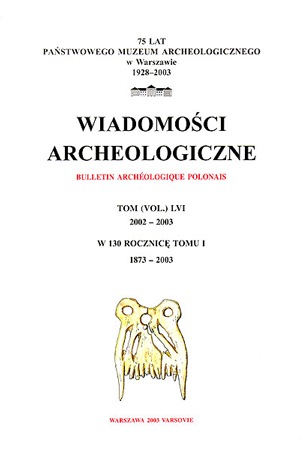About the journal
The Beginning
Volume I of Wiadomości Archeologiczne, first journal of archaeology in the Polish language, was published in Warsaw in 1873. Its founder and publisher was Count Jan Zawisza (1822-1886), great enthusiast of archaeology.
Three further issues followed in 1874, 1876 and 1882, during the time of active research activity by Jan Zawisza. Collected around Count Zawisza were leading representatives of the positivist school in archaeology, great champions of applying the scientific methods of geology, palaeontology, and chemistry in archaeological research. The journal published contributions by and profited from the assistance given to the publisher by his colleagues Józef Przyborowski - prominent archaeologist, Jan Tadeusz Lubomirski – historian, Zygmunt Gloger – ethnographer and archaeologist, Godfryd Ossowski – geologist and archaeologist.
The first four volumes of Wiadomości Archeologiczne published in a 23×15.5 cm format and numbering between 93 and 194 pages of print, were a 'dissertations only' publication and did not feature editorials, reviews or polemics. Most of these papers are concerned with reporting on investigations of caves in Poland and the search for the first traces of early man. Much space is devoted to the question of recording of archaeological finds and to reporting on the results of surface survey and sondage investigation made at various types of sites. Some articles by J. Zawisza are accompanied by abstracts in French. Articles are illustrated with woodcuts and photographs, either inserted within the text or as separate plates.
Between the World Wars
Poland regained independence in 1918 and as part of the process of building its institutional and legal system, including organising the framework for protecting prehistoric monuments, the decision was taken to resume publishing a journal of archaeology which would continue in the tradition of Wiadomości Archeologiczne. In 1920 the State Council for Preservation of Prehistoric Monuments (subsequently, PGKZP, abbreviation from the Polish Państwowe Grono Konserwatorów Zabytków Przedhistorycznych) adopted as one of its main tasks 'publication of Wiadomości Archeologiczne and promotion of prehistory among the general public'. The first volume of the renewed journal - Volume V - published a 'Draft Instruction by the Council of Ministers Regulation on Instituting the State Council for Preservation of Prehistoric Monuments' and a roster of Monuments Protection Officers and districts under their jurisdiction.
Until 1928 Wiadomości Archeologiczne were the official journal of PGKZP (Volumes V-IX) with first Włodzimierz Antoniewicz and subsequently Roman Jakimowicz as chief editor. The contents of each volume were grouped in the following sections: Papers (Rozprawy), Materials (Materiały), Notes (Drobne wiadomości), Discussion and Letters (Dyskusje i korespondencje), Editorial and Official Notices (Dział urzędowy), Obituaries (Nekrologi), Book and Article Reports (Sprawozdania z literatury). Most contributions were submitted by Monuments Protection Officers, members of PGKZP, reporting on their work in the field and research. Substantial space was given to the question of the protection of archaeological sites and artefacts and organising archaeology museums.
Contributions to the journal were made by outstanding Polish archaeologists and by specialists in related sciences - Erazm Majewski (first Chairman of PGKZP), Józef Kostrzewski, Włodzimierz Demetrykiewicz, Włodzimierz Antoniewicz, Jan Samsonowicz.
The restored Wiadomości Archeologiczne had the form of a quarterly journal but in practice most of the issues for a given year were published as a single volume, in a 25.5×19 cm format. Titles of articles and the table of contents were provided also in a French translation, and some papers were provided with abstracts in French.
In 1928 the State Archaeological Museum (subsequently, PMA, abbreviation from the Polish Państwowe Muzeum Archeologiczne) was officially instituted by the President of the Polish Republic (in practice it had been in operation since 1923). PMA inherited most of the duties and prerogatives of PGKZP. From 1929 Wiadomości Archeologiczne become a statutory publication and official journal of the Museum. Until 1938 under editor Roman Jakimowicz, Director of PMA six volumes of the journal were issued, one every year (X-XV), featuring papers, richly illustrated documentation from research, and extensive reports on the activity of PMA, its regional representatives, and Monuments Protection Officers. Except for Volume XV which had German translations of titles and summaries of topical articles, translation in other issues continued to be in French. Volume XII, from 1933, was entirely devoted to reporting on the 1st Congress of Polish Prehistorians, which had been organised in 1927 by the Polish Prehistoric Society and the PGKZP carried the title of a 'Diary from the 1st Congress, of Polish Prehistorians'.
Volume XVI, prepared in commemoration of the 25th anniversary of Prof. Józef Kostrzewski's research work to be published in 1939 was confiscated by the gestapo on the orders of officer Prof. Ernst Petersen, German archaeologist. Several score issues spared destruction were shipped to Poznań and published there with a new cover and title page in German and an introductory account on how a part of the edition had been rescued by Germans.
Wiadomości Archeologiczne – The Third Act
Publication of Wiadomości Archeologiczne was resumed only in 1948 with a re-edition of the commemorative pre-war Volume XVI. Its contents were reconstructed thanks to editor copies which had been rescued and placed in hiding by Konrad Jażdżewski and Kazimierz Salewicz. Volume XVI contains all the input assembled before the war ie, the biography of prof. Józef Kostrzewski and 26 articles, all but one with abstracts in French. An editorial by Ludwik Sawicki, then Director of PMA, with Russian, English and German language translations, gave an account of the dramatic vicissitudes of the issue being published. Major changes in the profile of the magazine were announced: '(...) starting with Volume XVII the journal would present only papers and detailed reports on excavation and research made at major sites. Minor papers dealing with analysis of finds, reviews of articles and books and reports on activities carried out by PMA (matters of organisation, research, artefacts conservation) would be featured in a special official journal established for the purpose - 'State Archaeological Museum Reports' (Polish - Sprawozdania Państwowego Muzeum Archeologicznego), published four times, or in some cases, twice a year'.
Wiadomości Archeologiczne started to be published with regularity from 1951, in A4 format, once again in fascicle form, with the fascicles printed jointly. The papers were organised under the headings corresponding to the chronological period with which they were concerned. When required, non-regular sections were added in some issues eg: Related Sciences (Nauki pokrewne) or History of Researches (Historia badań). The French language version of titles and abstracts was replaced by the same, in Russian and English.
Before long, (Volume XX, for 1954) new, quite radical transformations followed, to a certain extent precipitated by the decision to discontinue publishing the 'State Archaeological Museum Reports' (in Polish: Sprawozdania P.M.A). Starting with Volume XX Wiadomości Archeologiczne officially become a quarterly journal - its Number 1 was given '(...) a new arrangement of the subject matter and a new graphic layout', the editors called for response '(...) not only from archaeologists but also from specialists in museum science and conservation, and from research and technical staff in these fields'. Papers were now grouped under the following headings: Papers (Rozprawy), Finds (Materiały), Discoveries (Odkrycia), Miscellanea, Protecting the Archaeological Record (Ochrona zabytków), Museum Science and Conservation (Muzealnictwo i Konserwatorstwo), Reports (Sprawozdania), Reviews (Recenzje), Chronicle (Kronika). The covers were given new vignettes depicting eye-catching artefacts discussed in the issue. These changes - de facto restoration of the original 1920s template was officially endorsed by the Board of Editors of Wiadomości Archeologiczne in 1954. Prof. Witold Hensel, then the head of the Board made a motion to give up the subtitle 'Official Journal of the PMA' and this was done (starting from Volume XXIII/1:1956). On the same occasion PMA Director Prof. Zdzisław Rajewski proposed to include sections on matters of conservation and museum management, including also reports on activities of archaeology museums, archaeology departments and regional Monuments Protection Officers who did not have a journal of their own. These contributions would appear under various headings - Protecting the Archaeological Record (Ochrona zabytków), Museum Science and Management (Muzealnictwo), Museum Science and Conservation (Muzealnictwo i konserwatorstwo), Conferences, Museum Management and Protecting the Archaeological Record (Konferencje, muzealnictwo i ochrona zabytków) or in the traditional section Chronicle (Kronika). From as early as 1958 Wiadomości Archeologiczne continued as the 'Quarterly Journal of Museum and Archaeological Conservation Science in Poland' (but also as an 'Official Journal of the PMA'); Volume XXV/4:1958 [published in 1959]), although with a note that a new institution was now in charge of the publication. With time, this situation received an official stamp when the Wiadomości were given a new subtitle 'Official Journal of Museum and Archaeological Conservation Science' (Volume XXXII/1-2:1966, published in 1967).
During the 1970s paper became in short supply and publishers had to fight a losing battle to keep to the publishing schedule. Volume XL, Number 3 and Number 4 came out off the printing presses only in 1976, Volume XLI, Numbers 2, 3 and 4, scheduled to come out in 1976, appeared with a year of delay. By the time the two issues of Volume XLII had been published, also behind schedule (they were planned for 1977), the quarterly practically had been reduced to a semi-annual publication. In addition, its number of pages became drastically reduced (Volume XLI - 496 pages, Volume XLII - 255 pages). Authors were requested by the editors to make their contributions as short as possible (Volume XLIII/2:1978, note from the editor on the inside of the back cover); this was followed soon by an official instruction to the same effect (Volume XLIV/1:1979 [published 1980], page 103). Matters did not improve during the 1980s when the paper supply came under a quota system; Volumes XLIV and XLV (originally scheduled for 1979 and 1980 respectively) were published with a delay of one to two years, Volumes XLVI and XLVII (scheduled for 1981 and 1982 respectively) came off the printing presses two or even three years behind schedule and late in the 1980s the delay reached no less than five or six years... This should help explain the convoluted system which was developed to cope with the situation which could have the following form: Volume XLIX, Number 1:1984/1988 [published in 1988], Number 2:1983 (1989) [published in 1989], or Volume LI, Number 2:1986-1990 [published in 1992]). The editors felt it necessary to explain this embarrassing state of affairs and attempted to keep the date of the edition and the date of publication of consecutive Volume Numbers in agreement (see: Volume XLVII/2:1982 [published 1985] note on the inside of the back cover; Volume LI/1:1986-1990 [published 1992], note on the inside of the front cover).
When eventually, around 1995 PMA took over the responsibility of publishing the journal substantial changes were introduced in the graphic layout of the Wiadomości Archeologiczne retaining all the while retaining the traditional design in its form created during mid-1960s. The journal was given a hard glossy cover, keeping its traditionally white colouring and title in red font (first, in Volume XX/1:1954), in French (first, in Volume V:1920), but the black-and-white vignette (first, in Volume XX/1:1954) was replaced by a colour one. Starting from Volume LVI (LIV:1995-1998 [published in 2001]) Wiadomości Archeologiczne continued to appear once a year; starting with Volume LVI (2002-2003 [published in 2003]), besides having an English version summaries are translated into the language which corresponds to the subject matter of a given paper (eg Lithuanian, Byelorussian, Russian); sometime earlier captions to all illustrations started to be given also in English; sometime earlier (Volume LI/2:1986-1990, published in 1992) the practice of providing abbreviated versions in Russian was dispensed with. Starting from Volume LVII (2004-2005 [published in 2005) editors decided to remove the no longer appropriate subtitle - 'Official Journal of Museum and Archaeological Conservation Science' - (the 'Museum Science and Conservation' section had featured for the last time in Volume XLVIII/2:1983 (1987) [published in 1987] ). In 2019 (volume LXX) layout and graphic design of the journal has been changed, but the traditional white background of the cover was retained. Starting from 2020 (volume LXXI), editorial work is carried out using the Editorial System platform.
Volume LVI of Wiadomości Archeologiczne was issued on the 75th anniversary of the establishment of the State Archaeological Museum and the 130th anniversary of the publication of the first volume of the journal. Other important dates had been commemorated by earlier issues: Volume XXXIII/3-4, (for 1968) - 45th anniversary of the PMA (marking its start in 1923) - and Volume XXXVIII/2, for 1973 - 50th anniversary of the PMA, centenary of Wiadomości Archeologiczne, and 330th anniversary of the Arsenal Building in which PMA is housed at present.
The Indexes
Volume XXI (for 1955/56), printed in 1957 as a single book, contains an index to Volumes I -XX compiled by Jerzy Antoniewicz. The next index, for Volumes XXII-XXXV compiled by Marek Halicki, was published in Volume XXXVI/4, for 1971 (published 1972), the third and so far the last index, covering Volumes XXXVI-XLVII, compiled by Ewa Gieysztor-Szymczak, was published in Volume L/1:1985 (1989) (published 1989).
The Editors
Starting from 1954 (Volume XX) the journal was edited by a Committee, its two members Zdzisław Rajewski and Jerzy Antoniewicz assisted by the Council of Editors. In an earlier period (Volumes XVII-XIX) no information was given on who is the editor, perhaps to emphasise that the journal was edited collectively; during this period Jerzy Antoniewicz was Secretary of the Editing Committee. In 1957 (Volume XXIV/1-2) the Editing Committee was replaced by a team of editors - Zdzisław Rajewski - Chief Editor, Jerzy Antoniewicz -Secretary and Witold Bender - Sections Editor. In 1959 (Volume XXVI/1-2), after Jerzy Antoniewicz resigned from his post, Jerzy Halicki became Deputy Editor and continued on the editing team for over two decades (until Volume XLVI/2:1981 [published in 1984]). More substantial change came in 1975. When Zdzisław Rajewski died in 1974 the post of Chief Editor was assumed by the new Director of PMA Krzysztof Dąbrowski (Volume XL/1:1975), and new editors entered the team, among them the present day Deputy Editors (starting from Volume L/2:1985) - Teresa Dąbrowska and Teresa Węgrzynowicz. Krzysztof Dąbrowski lived to see Volume XLIV Numbers 1 and 2 in print before his departure in 1979. He was succeeded in 1981 as director of PMA and Chief Editor by Jan Jaskanis (Vol. XLV/2:1980 [published in 1982]), who continued until his retirement in 2000. From 2001 the Chief Editor has been Wojciech Brzeziński, Director of PMA (cf Vol. LIV:1995-1998 [published in 2001], p. 2). After 1980 there were some changes on the Editorial Staff. Starting from Volume L/2 (for 1985, published in 1990) it was joined by Andrzej J. Tomaszewski, Grażyna Dmochowska-Orlińska and Wojciech Brzeziński, also, briefly, by Wojciech Rozwadowski (Managing Editor in 1990-1992); starting from Volume LII/1 (for 1991-1992, published in 1992) Jacek Andrzejowski (Managing Editor from 2001), from Volume LIV (for 1995-1998, published in 2001) Radosław J. Prochowicz, from Volume LIX (for 2007) Barbara Sałacińska, and from Volume LXI (for 2010) Katarzyna Watemborska-Rakowska. In 2011, Teresa Węgrzynowicz in 2013 Teresa Dąbrowska, and in 2018 Barbara Sałacińska withdrew from the team. In 2020 Kaja Jaroszewska joined the Editorial Board.
In 2009 a permanent Board of Peer Reviewers was established, composed of several distinguished Polish archaeologists of the leading research centres and from volume LXI (2009-2010 [ed. 2010]) all articles submitted to the Editor are reviewed using the double blind option, according to uniform principles. Since 2014 Editor is supported by the Scientific Advisory Board, chaired by Professor Wojciech Nowakowski (now Faculty of Culture and Arts, Warsaw University).
The Publishers
A number of the fist volumes of Wiadomości Archeologiczne released soon after the end of the war was published by the PMA. From 1954 onwards, when the shape of the journal changed (starting from Volume XX), the task passed to state publishers - Państwowe Wydawnictwo Naukowe, and in 1959, Książka i Wiedza (just two Volumes - XXXVI and XXXVII /1). From 1960 for nearly fifteen years Wiadomości Archeologiczne continued to be published by Ossolineum (Volume XXVII/2, published in 1961). Starting from 1974 (Volume XXXIX/1), with only a small break for Volumes XLVI/1:1981 - LIII/1:1993-1994 (published respectively in 1984 and 1995 by Wydawnictwa Akcydensowe) Wiadomości Archeologiczne continue to be published by the State Archaeological Museum in Warsaw.


